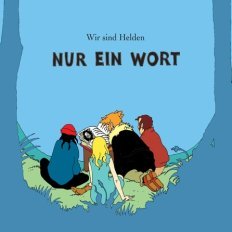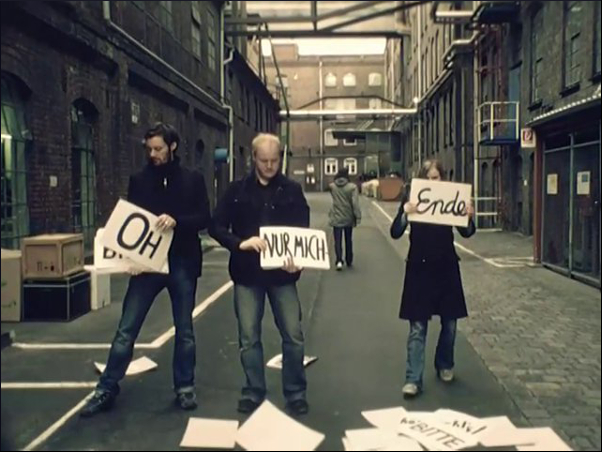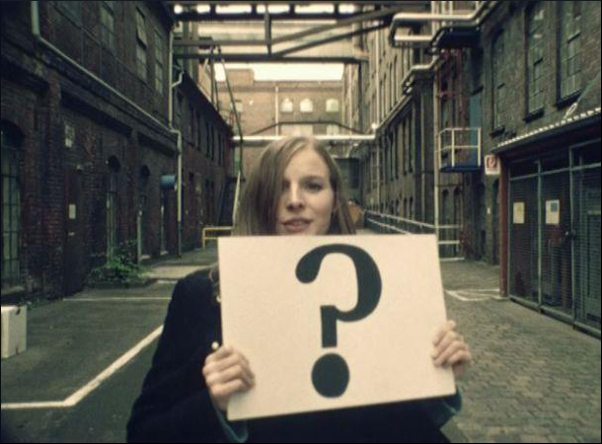
- Nur ein Wort
- Released in: 2005
A love song written from the perspective of a girl who’s in love with a boy but cannot communicate with him.

A love song written from the perspective of a girl who’s in love with a boy but cannot communicate with him.
Wir sind Helden's “Nur ein Wort” (Just One Word) is a 2005 love song written from the perspective of a girl who’s in love with a boy but cannot communicate with him. This last element is central to the song. Words and expressions all revolve around the subject of speech: “hör'” (hear), “Wörterbuch” (dictionary), “A bis Z” (A to Z), “Worte” (words), “Mund” (mouth), “du schweigst” (you are silent).
During the song’s first lines, the singer describes her problems. She cannot know what goes on inside the boy’s head because she does not hear him: “Aber ich hör' dich nicht.” The lyrics use the stylistic device of anadiplosis in the opening three verses. That is, the last verb of each verse is repeated at the beginning of the following verse: “Ich sehe, dass du denkst, ich denke, dass du fühlst, ich fühle,dass du willst” (I see that you think, I think that you feel, I feel that you want). In this way, the language itself becomes elusive, mirroring the elusiveness of the boy. This is also expressed in the chorus, when the singer begs the boy to communicate: “Bitte gib mir nur ein.” The term “wort” (word) is actually not pronounced until the very last line. Before that, it is replaced seven times by the onomatopoetic “oh,” expressing a desperate sigh.
Although the girl begs the boy to speak, she is also attracted to him, not in spite of his silence but because of it. This recalls the classical and medieval genre of Minnesang, courtly love poetry in which a man addresses a woman without receiving a reply. In Minnesang poems, the speaker complains about his unsuccessful attempts to court a lady, while the lady in question remains mostly distant. “Nur ein Wort” can actually be seen as a kind of postmodern pastiche of Minnesang, reversing the traditional gender roles.

The lyrics continually fluctuate between the concrete and the abstract. The abstract noun “worte” (words), for example, is used as if it described a concrete object, when the singer says she is piling up words: “Ich stapel tausend wirre Worte auf.” The noun then becomes even more anthropomorphized (or human-like) when the words actually pluck the boy’s sleeves: “Worte (...)/ die dich am Ärmel ziehen.” This underlines the subject of the song, the importance of communication and language, as things that are normally thought to be completely abstract are given substance through verbal expression. Even the boy’s silence takes on a very specific and three-dimensional form, described as a tent that the boy puts up: “Dein Schweigen ist ein Zelt” (Your silence is a tent). At night, the girl even stumbles over this tent’s lines: “wenn Nachts ein Mädchen d`rüber fällt.”

“Nur ein Wort” also uses some proverbs, conveying their figurative meaning while also employing their literal sense. For example, the girl says, “Wenn du schon auf den Mund fallen musst, warum dann nicht auf meinen?” As a proverb, “Nicht auf den Mund gefallen sein” normally means that someone is very talkative, and in this context, it highlights the boy’s silence. But the song also illustrates the proverb’s literal meaning, as the singer asks why the boy does not fall on her mouth. Thus, the main concepts of silence and love are interwoven through a kiss.
The transitions between abstract and concrete concepts and images, combined with several stylistic devices and an element of intertextual pastiche, constitute the poetic quality of this pop song. The girl needs the boy’s words because, without language, she has nothing to hold on to. The song shows the importance of language, as the singer explores its possibilities and actually adds tangible substance to certain concepts. “Nur ein Wort” is a rather rare example of refined and poetic language in contemporary pop music.